Building an offshore development partnership without a comprehensive checklist is like launching a rocket without a flight plan—you might get off the ground, but you probably won’t reach your destination.
The reality is that outsourcing failures often stem from poor vendor selection and inadequate due diligence, making structured evaluation absolutely critical.
Your offshore development center choice will determine whether your project delivers on time and budget, or becomes another cautionary tale. The difference between success and failure often comes down to evaluating the right criteria before signing contracts.
This article provides 25 critical success factors across technical capabilities, communication protocols, security standards, and cultural alignment. I’ll show you exactly what to assess, what questions to ask, and what red flags to avoid when choosing your offshore development partner.
Companies using structured vendor evaluation frameworks consistently outperform those relying on basic cost comparisons when it comes to long-term partnership success.
Successful offshore development partnerships require evaluating 25 critical factors across technical expertise, communication standards, and security frameworks. Modern teams with strong AI capabilities can deliver significantly faster launches with fewer bugs when properly assessed.
Core technical capabilities your offshore team needs
Your offshore development team must demonstrate proficiency across your entire technology stack, not just claim familiarity with buzzwords on their website. The acceleration of digital transformation means technical versatility is absolutely critical for adapting to changing requirements.
Start by requesting actual code samples and technical assessments for your required programming languages—Java, .NET, Python, JavaScript, React, Angular, and frameworks like Spring Boot. Don’t accept portfolios or case studies as proof of expertise. I’ve seen too many vendors with impressive marketing materials who crumble during technical interviews.
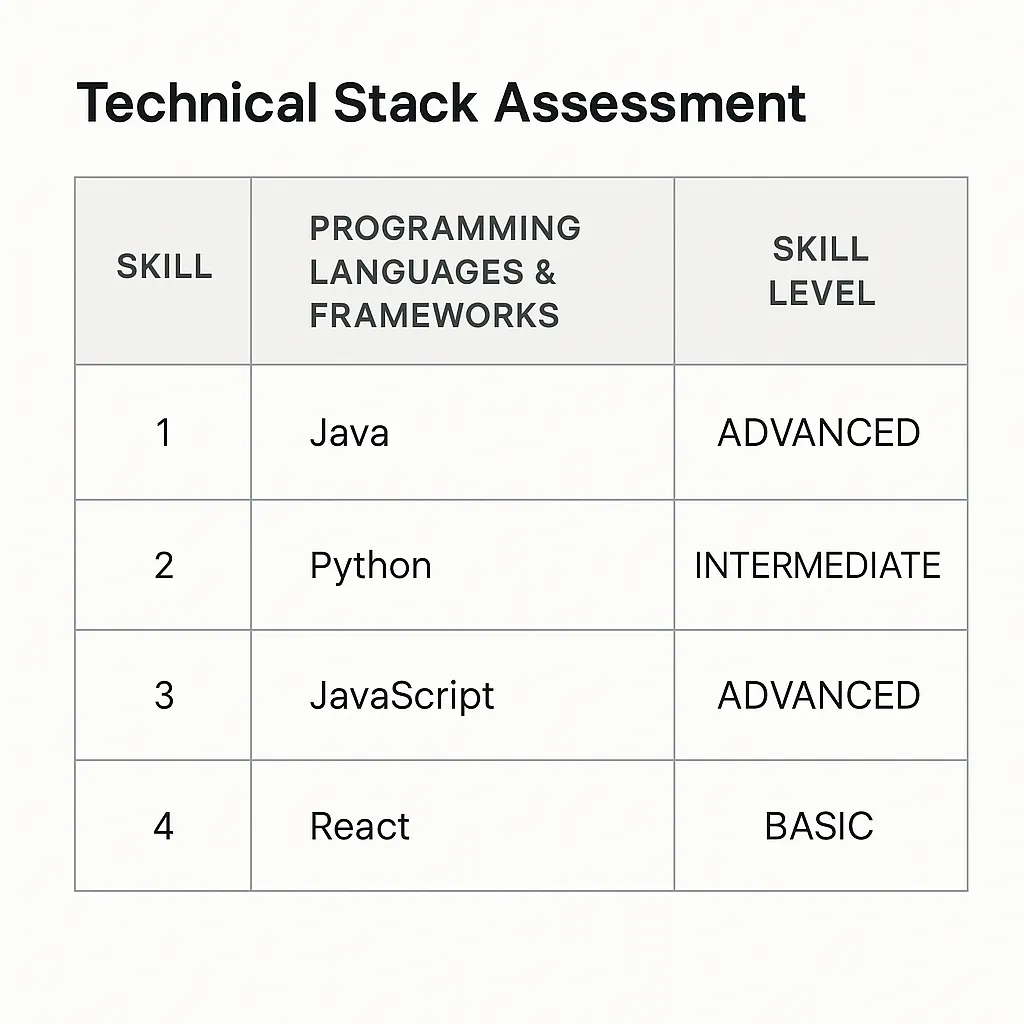
Fig.1 Technical stack assessment matrix with skill levels
Verify their experience with modern development methodologies including Agile, DevOps, and continuous integration practices. Look for hands-on coding challenges that reveal actual capabilities rather than theoretical knowledge.
Look for teams that stay current with technology trends and can demonstrate recent projects using contemporary frameworks. The technology landscape changes rapidly, and partners stuck using outdated approaches will slow your development velocity.
Essential programming languages and frameworks to verify:
- Front-end: React, Angular, Vue.js
- Back-end: Node.js, Python, Java, .NET Core
- Mobile: React Native, Flutter, Swift, Kotlin
- Cloud platforms: AWS, Azure, Google Cloud
- DevOps tools: Docker, Kubernetes, Jenkins
Why AI capability matters for competitive advantage
AI integration capability has become non-negotiable for competitive offshore development partnerships. AI software revenue is expected to reach $297 billion by 2027, with enterprise adoption accelerating across all development phases.
Evaluate your potential partner’s AI integration across the entire development lifecycle—from GitHub Copilot for coding acceleration to automated testing frameworks. The most effective teams don’t just use AI tools; they understand how to optimize them for your specific project requirements.
SmartDev’s VERA AI Agent won the 2025 Sao Khue Innovation Award for applied AI excellence, demonstrating how properly implemented AI can reduce manual customer care workload by 50%.
Demand to see specific examples of AI-powered development outcomes. Look for providers where developers have defined AI skill certifications, not just teams that mention AI in their marketing materials.
Cloud platform expertise requirements
Modern offshore development requires deep expertise across major cloud platforms—AWS, Microsoft Azure, and Google Cloud Platform. Global public cloud spending is expected to reach $723.42B in 2025, making cloud-native capabilities essential for scalable development.
Your offshore partner must demonstrate hands-on experience with cloud-native architectures, not just basic hosting capabilities. Assess their DevOps capabilities, automated deployment processes, and ability to scale infrastructure based on changing project requirements.
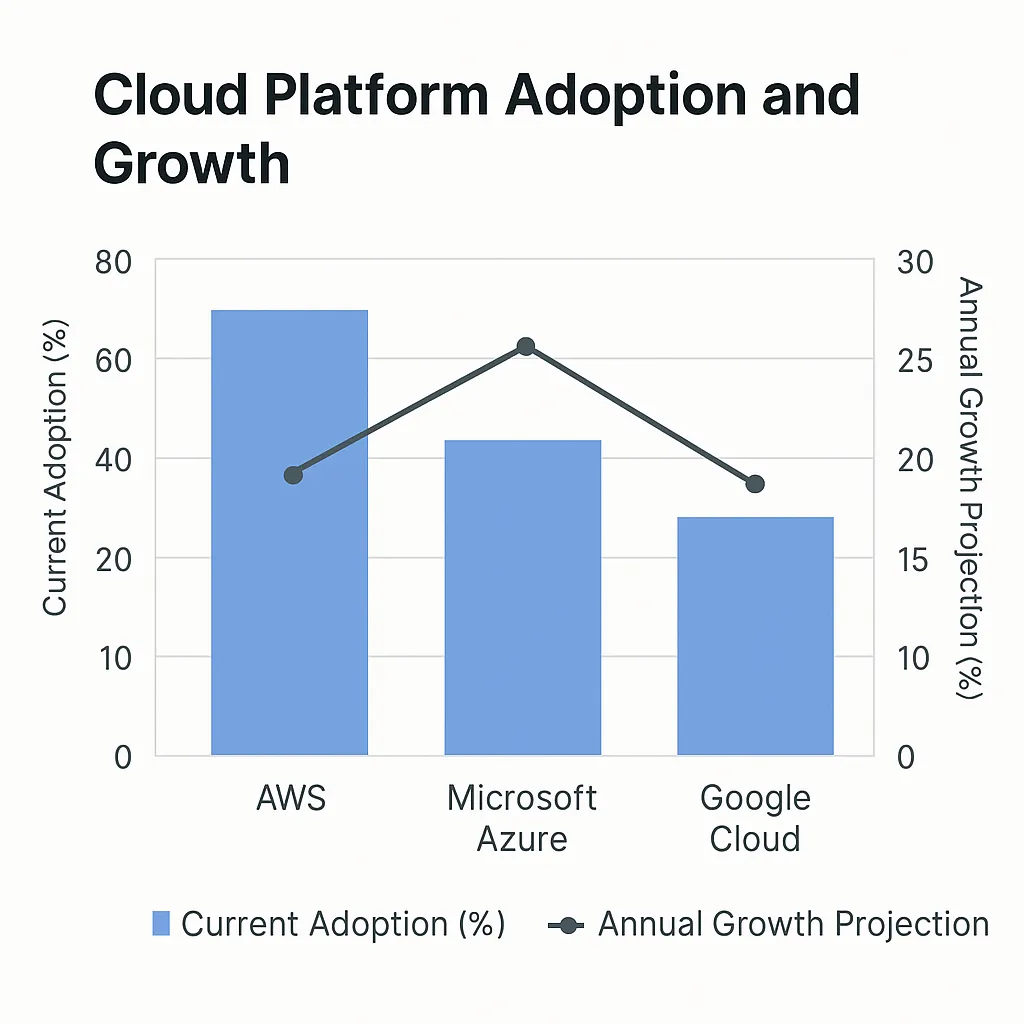
Fig.2 Cloud platform adoption rates and growth projections
SmartDev’s migration of 250K+ users to a cloud-native VeryPay platform improved system uptime to 99.98% and supported 2x transaction growth, according to company reports. This type of proven scalability indicates genuine cloud expertise.
Verify their ability to implement proper cloud security practices, cost optimization strategies, and disaster recovery procedures. Cloud expertise isn’t just about deploying applications—it’s about building resilient, scalable systems that grow with your business needs.
Communication standards that prevent project failures
Effective communication starts with verifying English proficiency levels, not just accepting assurances from sales teams. According to SmartDev’s internal standards, 70% of their staff possess strong English communication skills for seamless collaboration, which should be your baseline expectation.
Establish clear communication channels and response time expectations for different types of inquiries. Daily standups, weekly progress reviews, and monthly strategic sessions should be standard practice, not optional add-ons that increase project costs.
Test their communication protocols during the evaluation phase. Schedule video calls at different times, send detailed technical questions via email, and observe how quickly and accurately they respond. Communication breakdown is cited as a major factor in transformation failures, impacting over half of struggling projects.
Communication framework essentials:
- English proficiency verification through live technical interviews
- Response time SLAs for different inquiry types
- Structured meeting cadence with defined agendas
- Real-time collaboration tools integrated with your workflow
Time zone management for seamless collaboration
Time zone alignment requires strategic planning beyond simple math calculations. Distributed teams using optimized overlap strategies see higher productivity when they maintain 4-6 hours daily overlap for critical collaboration.
Evaluate the overlap hours with your business operations for real-time collaboration needs. Critical project phases, emergency support, and stakeholder meetings require live interaction that can’t be replaced by email chains or delayed responses.
SmartDev integrates dedicated working groups with defined overlap periods, reportedly reducing project bottlenecks and increasing sprint completion rates. This isn’t about forcing offshore teams to work at inconvenient hours—it’s about finding sustainable collaboration windows.
Plan for asynchronous communication workflows that maintain productivity during non-overlap hours. Well-structured asynchronous workflows can actually boost productivity compared to rigid real-time-only models, but only when properly implemented.
Agile methodology implementation beyond buzzwords
Agile methodology implementation goes far beyond claiming to use Scrum or Kanban frameworks. The adoption of composable Agile frameworks has become a strategic priority for most companies, with certified coaches demonstrating measurable delivery improvements.
Verify their experience with specific Agile frameworks relevant to your workflow, including Scrum, Kanban, or hybrid approaches. More importantly, confirm they have certified Agile coaches with proven software development backgrounds, not just project managers with Agile certifications.
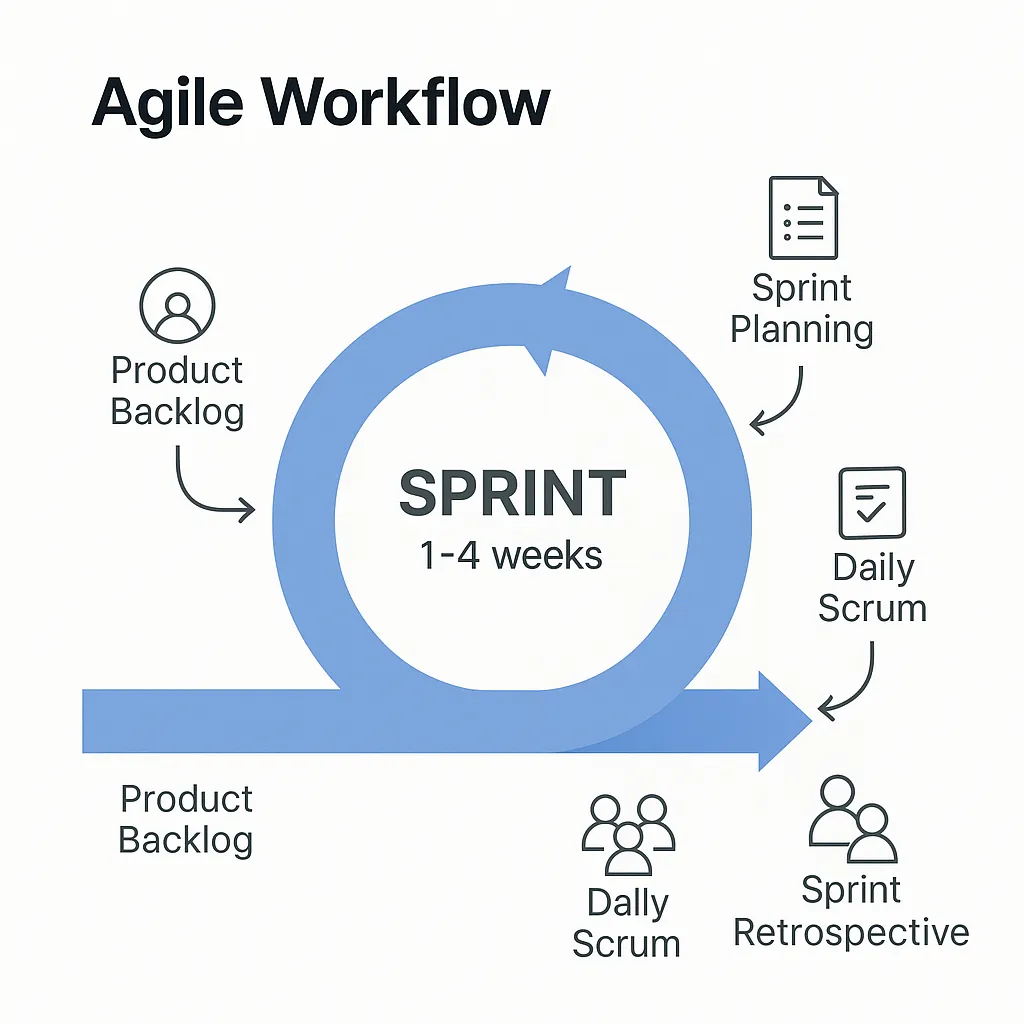
Fig.3 Sprint cycles and stakeholder touchpoints
SmartDev applies Scrum/Kanban hybrids for clients, reporting decreased backlog volume and improved on-time delivery. However, this requires a deep understanding of Agile principles, not just surface-level process adoption.
Test their ability to integrate with your existing project management tools and processes. The best offshore partners adapt their Agile practices to complement your internal workflows rather than forcing you to change your established systems.
Security certifications you can’t compromise on
Security certifications provide verifiable proof of data protection capabilities, not marketing talking points. ISO/IEC 27001 certification adoption is trending upward, with many clients now requiring SOC 2 Type II compliance for offshore partners.
Require ISO/IEC 27001 certification for information security management systems and SOC 2 Type II compliance for data handling and security controls. These aren’t optional nice-to-haves—they’re minimum requirements for protecting your intellectual property and customer data.
SmartDev successfully completed SOC 2 Type II audit for a US healthcare client in 2024, enabling compliance with HIPAA and GDPR for 500K+ patient records, according to company documentation. This demonstrates real-world application of security standards under regulatory scrutiny.
Non-negotiable security requirements:
- ISO/IEC 27001 certification for information security
- SOC 2 Type II compliance for data handling
- Regular security audits with documented procedures
- Incident response protocols with clear escalation paths
Industry compliance for regulated sectors
Industry-specific compliance requires deep understanding of regulations like PCI DSS, GDPR, and HIPAA, not general security awareness. Healthcare AI adoption continues growing, with telehealth platforms requiring strict compliance frameworks.
Confirm your offshore partner has hands-on experience with regulations specific to your industry. Request documentation of their compliance monitoring processes, audit trails, and regulatory change management procedures.
SmartDev customized a PCI DSS & GDPR compliant digital payment system for VeryPay, supporting over 2 million active users without reported compliance violations since launch, according to company statements. This type of proven regulatory track record should be your minimum expectation.
Verify their ability to handle sensitive data according to multiple regulatory frameworks simultaneously. Many projects require compliance with overlapping regulations, and your offshore partner must understand the complexities of multi-jurisdiction requirements.
IP protection measures that actually work
Intellectual property protection starts with clear legal agreements but extends to technical implementation and ongoing monitoring. Contract best practices increasingly include explicit IP agreements and NDAs as standard components.
Establish comprehensive intellectual property ownership agreements, non-disclosure protocols, and employee background check processes. Your offshore partner should implement security clearance procedures for developers accessing sensitive code repositories.
SmartDev implements background checks, secure repository access, and automated audit trails, reporting zero unauthorized code access incidents over three years. This multi-layered approach protects IP at both contractual and technical levels.
IP protection framework:
- Comprehensive IP ownership agreements with clear transfer clauses
- Employee background verification for sensitive project access
- Code repository security controls with detailed audit trails
- Regular compliance monitoring with documented procedures
Testing methodologies that ensure quality
Modern testing requires automated frameworks and continuous integration capabilities, not manual QA processes that slow development velocity. AI-powered testing tools can significantly reduce manual effort while improving code quality through comprehensive automated coverage.
Evaluate their automated testing frameworks including unit testing, integration testing, and performance testing protocols. Look for teams that achieve high automated coverage rates for enterprise projects rather than relying primarily on manual testing.
SmartDev’s automated test suite caught 96% of regression issues before release for a major fintech deployment, supporting the goal of fewer post-launch bugs, according to internal case studies. This demonstrates the practical impact of sophisticated testing methodologies.
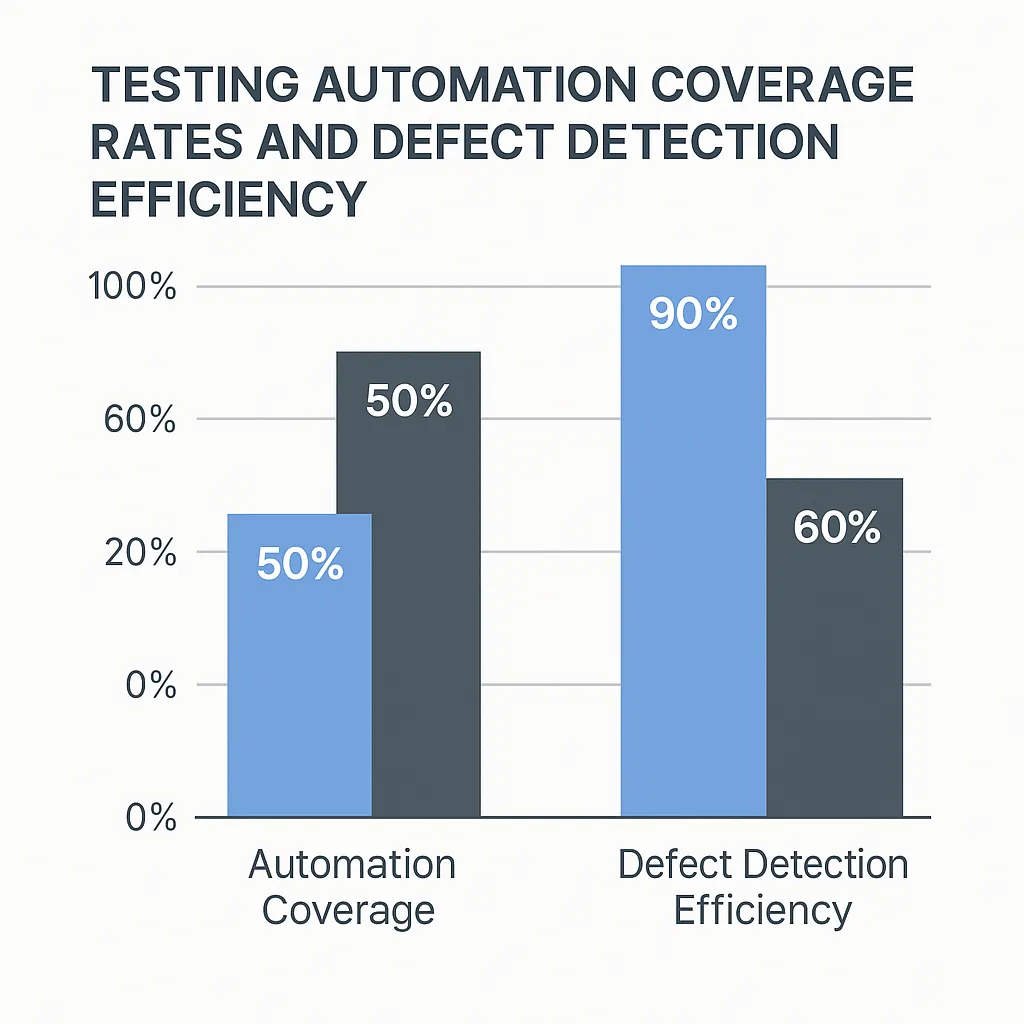
Fig.4 Testing automation coverage rates and defect detection efficiency
Verify their continuous integration capabilities and automated deployment processes. Top-performing teams implement continuous integration with performance testing, reducing QA costs while maintaining higher quality standards.
Ready to build a high-performing Offshore Development Center that avoids hidden risks and ensures long-term success?
Explore the essential frameworks, governance models, and operational practices every company needs in a successful ODC setup.
Learn how to apply proven ODC strategies covering communication, team culture, engineering processes, and partnership management.
Explore the Complete Offshore Development Center ChecklistCode quality maintenance strategies
Code quality maintenance requires mandatory review processes with defined quality gates, not optional suggestions that teams can ignore during tight deadlines. AI-assisted development can enable faster pull request turnaround with high code style compliance rates.
Establish automated code analysis tools and maintain detailed coding style guidelines that integrate with your development workflow. The best offshore partners implement these standards from project inception, not as afterthoughts during quality audits.
SmartDev enforced code review gates for a logistics client, reportedly shortening merge-to-release cycles from 3 days to under 24 hours with zero critical defects post-release. This demonstrates how proper quality processes actually accelerate delivery.
Quality assurance essentials:
- Automated code analysis integrated into CI/CD pipeline
- Mandatory peer review processes with approval gates
- Coding standards enforcement through automated tools
- Quality metrics tracking with defined improvement targets
Bug resolution timeframes that matter
Bug resolution requires clear classification systems with corresponding timeframes, not vague promises about “quick fixes” that lack accountability. SmartDev resolves critical bugs on average within 24 hours, with escalation protocols cutting emergency support response time by 40%, according to internal metrics.
Define specific bug classification systems—critical, high, medium, low—with corresponding resolution timeframes and escalation procedures. Critical security vulnerabilities should be addressed within hours, not days.
SmartDev tracked defect detection and resolution for an EdTech client, lowering post-release bug rates from 8% to under 2% through rigorous tracking and escalation processes, based on company-reported outcomes. This type of measurable improvement should be standard.
Establish escalation procedures for emergency support with clear contact protocols and backup resources. Well-structured QA processes can achieve significant post-release defect reduction through systematic tracking and resolution.
Cultural alignment that drives long-term success
Cultural alignment significantly impacts long-term partnership success and team productivity, extending far beyond basic communication capabilities. SmartDev maintains a retention rate 2x the sector average through policies like hybrid work, generous leave, and premium benefits, according to internal HR data.
Assess their work-life balance policies, employee retention rates, and commitment to continuous learning programs. Teams with high turnover create project continuity risks and knowledge transfer problems that undermine development quality.
SmartDev introduced continuous learning workshops and hybrid work policies for a Swiss enterprise client, resulting in 90%+ team satisfaction and 20% lower attrition over 24 months, based on partnership documentation. This demonstrates how cultural alignment creates measurable business benefits.
Evaluate their investment in professional development and technology infrastructure upgrades. Cultural alignment significantly impacts long-term partnership success, with well-aligned teams delivering substantially better partnership outcomes.
Team scaling capabilities for growth
Team scaling capabilities require robust talent pipelines and quality maintenance processes, not just promises about rapid resource addition. SmartDev’s average time-to-hire for skilled developers is under 2 weeks, scalable up to 40 new resources per month, according to company talent acquisition data.
Verify their talent acquisition processes and average time-to-hire metrics for developers with your required skill sets. Rapid scaling should never compromise quality standards or project delivery timelines.
SmartDev scaled a team from 8 to 50 developers for a logistics rollout, maintaining 96% sprint velocity and 99% client satisfaction ratings throughout the expansion, based on project documentation. This demonstrates systematic scaling capability under real project pressure.
Scaling assessment criteria:
- Talent pipeline depth with pre-qualified candidates
- Average time-to-hire metrics for your technology stack
- Quality maintenance processes during rapid expansion
- Onboarding efficiency with structured mentorship programs
Long-term partnership reliability indicators
Long-term partnership reliability stems from proven track records of multi-year client relationships and consistent technology investment. SmartDev’s 5+ year relationships contributed to 175% revenue growth, with current client satisfaction ratings at 4.8/5.0, according to internal business metrics.
Look for providers with documented 5+ year client relationships rather than impressive client lists that might represent short-term projects. Long-term partnerships indicate consistent quality delivery and effective problem resolution capabilities.
Since 2016, SmartDev’s Swiss client portfolio achieved consistent 98%+ satisfaction, supporting ongoing renewals and infrastructure expansion, based on client feedback data. This type of sustained performance demonstrates genuine partnership capability.
Evaluate their investment in employee training and technology infrastructure upgrades as indicators of long-term commitment. Providers delivering consistent quality over extended periods typically report higher revenue growth and client satisfaction ratings.
Pricing models that align with your goals
Pricing model selection depends on project characteristics and risk tolerance, not just cost minimization. AI-powered development teams can achieve significant productivity improvements, with billing transparency cited as the top trust criterion by most buyers.
Compare fixed-price, time-and-materials, and dedicated team pricing structures based on your project requirements. Fixed-price works for well-defined projects, while T&M suits exploratory development, and dedicated teams provide ongoing capacity.
SmartDev implemented a hybrid pricing model for a US-based SaaS client, tracking cost savings and productivity increases in monthly reports, according to partnership documentation. This transparency builds trust and enables collaborative cost management.
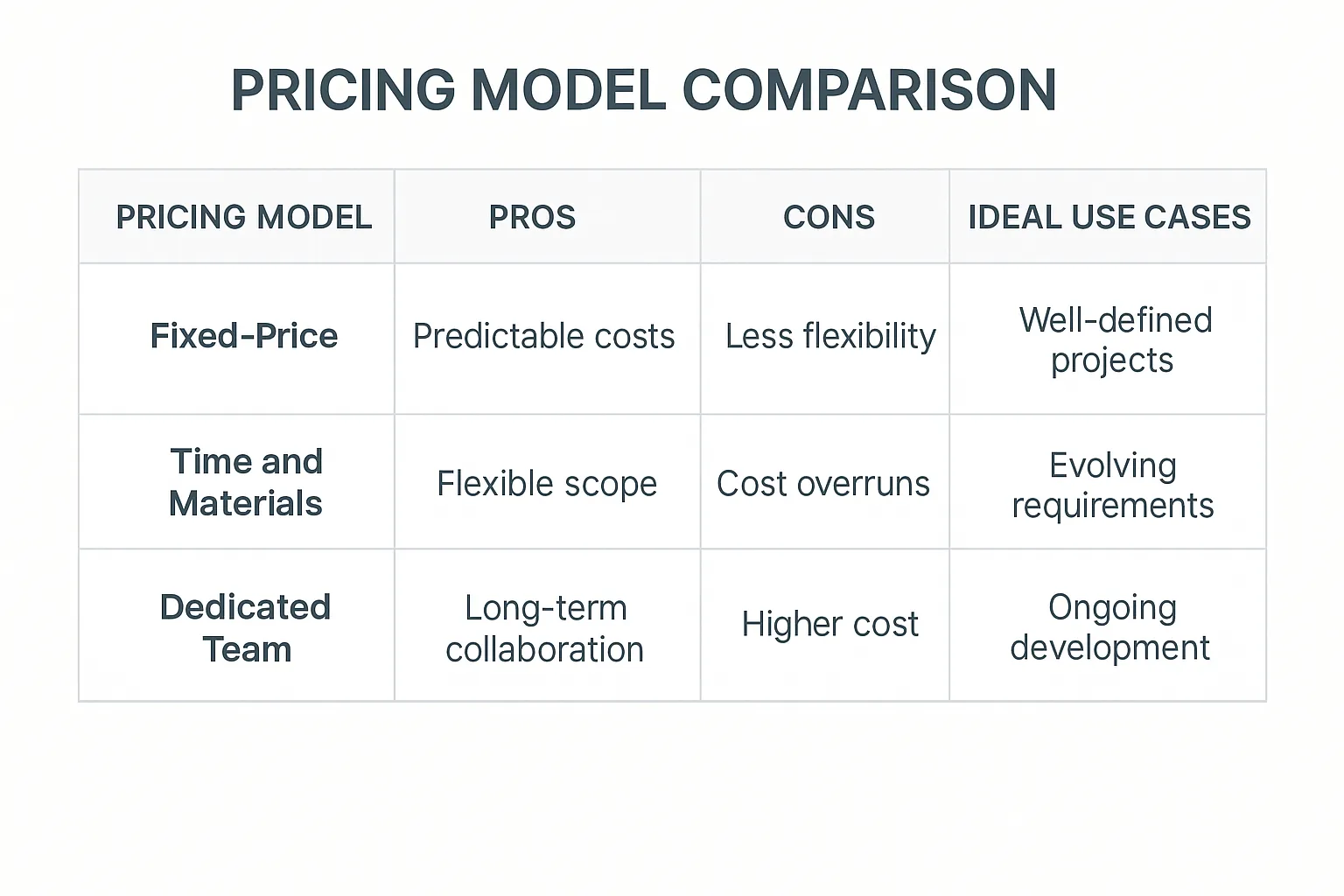
Fig.5 Pricing model comparison with pros, cons, and ideal use cases
Ensure transparent billing practices with detailed breakdowns of development costs, infrastructure expenses, and any additional fees. Top providers offer flexible pricing models with improved ROI following AI automation implementation.
Contract terms that protect your interests
Contract terms should include provisions for scope changes, timeline adjustments, and clear termination procedures. Most clients now require contract provisions for scope adjustment, with IP transfer clauses included in the majority of new contracts, based on industry contracting trends.
Include detailed service level agreements with measurable performance metrics and penalties for non-compliance. Vague contract language creates disputes and project delays that undermine partnership effectiveness.
SmartDev negotiated scope change and SLA terms for a telecom partner, reducing dispute rates and increasing timeline predictability through clear contract frameworks, according to partnership documentation.
Essential contract components:
- Scope change procedures with defined approval processes
- Performance SLAs with measurable metrics and penalties
- IP ownership transfer clauses with clear documentation
- Termination procedures protecting both parties’ interests
Financial stability assessment methods
Financial stability assessment requires verification through references, certifications, and parent company backing rather than accepting marketing claims. SmartDev’s annual revenue is estimated at $41.2M, with 26% employee growth and Verysell parent company financial backing, based on available business documentation.
Verify their financial stability through client references, industry certifications, and documented growth metrics. Request information about their parent company or ownership structure for additional financial security.
SmartDev’s payment terms enable milestone-based delivery and protect both parties during economic disruptions through structured financial frameworks, according to partnership agreements.
Consider providers with strong parent company backing for additional financial security and business continuity assurance. Providers with referenceable financial stability typically outperform independent vendors in client retention rates.
Industry experience that accelerates delivery
Industry-specific experience accelerates project timelines and reduces implementation risks through deep understanding of sector requirements and regulations. SmartDev delivered 300+ projects across fintech, healthcare, retail, and logistics with 100+ documented case studies, according to company portfolio data.
Prioritize providers with proven experience in your industry vertical rather than generalists who claim adaptability to any sector. Industry expertise includes understanding regulatory requirements, user expectations, and technical challenges specific to your business.
SmartDev’s VeryPay mobile money platform, tailored for telecom vertical compliance, grew to 2 million active users and earned two Sao Khue Awards for industry innovation.
Verify their understanding of industry-specific regulations, compliance requirements, and best practices that impact your development approach. Industry-specific providers can reduce implementation risks and accelerate delivery timelines significantly.
Case studies that demonstrate real results
Case studies should demonstrate similar project complexity and scale with measurable results, not generic success stories that lack specific details. SmartDev maintains 100+ documented case studies across multiple industries with detailed project outcomes, according to their experience portfolio.
Request case studies that match your project requirements in terms of technology stack, team size, timeline, and business objectives. Generic portfolio pieces don’t provide useful evaluation criteria for your specific needs.
SmartDev’s experience portal showcases A-to-Z project outcomes with retail, education, and fintech clients reporting 98% satisfaction through transparent case study documentation, based on client testimonials.
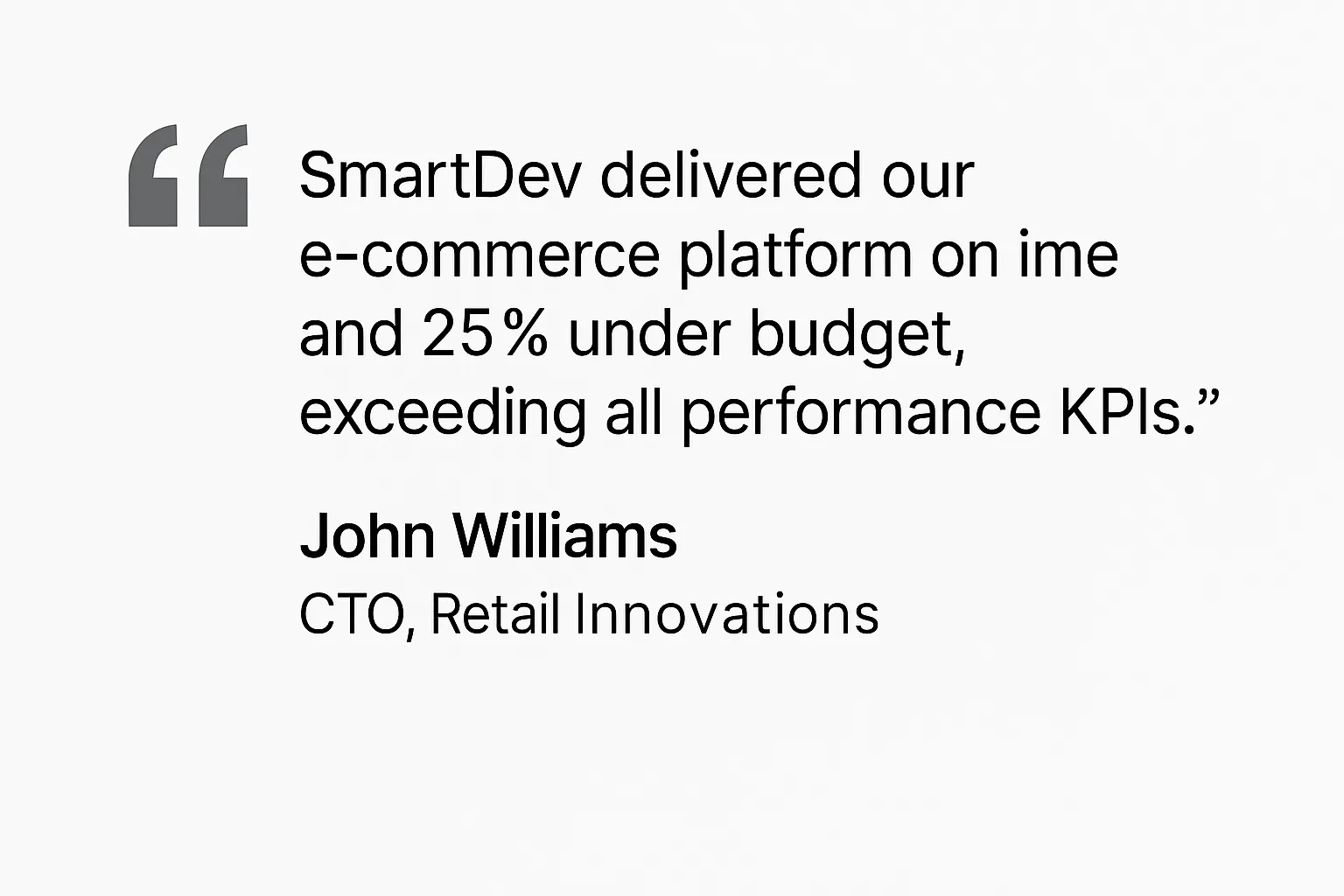
Fig.6 Client testimonial highlighting specific measurable outcomes
Contact previous clients directly to verify claimed results and partnership satisfaction levels rather than relying solely on provider-supplied testimonials. Top firms maintain extensive multi-industry case studies and provide direct client referral access.
Industry awards that validate capabilities
Industry awards provide independent validation of capability and delivery quality when issued by reputable organizations. SmartDev won five major Sao Khue awards (2024-2025), plus SME100 Winner recognition and Clutch Top 100 Fastest Growing Companies listing.
Consider providers with recognized industry awards like Sao Khue for IT excellence, Clutch rankings, and relevant certifications that demonstrate consistent quality delivery and client satisfaction.
SmartDev’s Sao Khue-winning VeryPay and VERA AI solutions showcased fintech and AI innovation recognized by both Vietnamese IT associations and global ranking organizations. Verify their inclusion in reputable rankings and award programs that evaluate actual performance rather than just marketing effectiveness.
Award-winning firms typically demonstrate higher client retention and satisfaction rates compared to unrecognized providers.
Your next steps for offshore development success
Building successful offshore development partnerships requires systematic evaluation across technical, operational, and cultural dimensions. This 25-point checklist provides the framework for making informed decisions that support long-term project success.
The difference between offshore partnership success and failure often comes down to thorough due diligence during the selection process. Companies that invest time in comprehensive evaluation report significantly better outcomes than those rushing into partnerships based on cost considerations alone.
Ready to find an offshore development partner that meets these critical success factors? Explore SmartDev’s AI-powered development capabilities and see how their proven track record addresses every item on this checklist.
Want to dive deeper into offshore development best practices? Read the comprehensive Master Offshore Software Development Guide for detailed implementation strategies and evaluation frameworks.
Looking for expert guidance on your specific requirements? Contact the talent solutions team to discuss how they can support your offshore development objectives.








